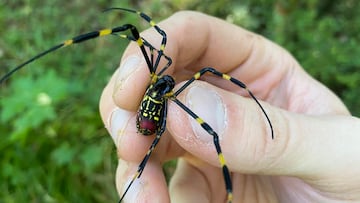Are Joro spiders venemous? What to know if you come across one of these giant venemous creatures
While Joro spiders may look intimidating due to their size and appearance, they are not aggressive and are unlikely to cause harm unless directly provoked.


Joro spiders, also known as Trichonephila clavata, are large spiders native to East Asia, particularly Japan, Korea, China, and Taiwan. These spiders have a distinctive appearance, with vibrant yellow markings on their abdomens and can grow to be quite large, with leg spans reaching up to 4-5 inches (10-12 cm).
They are considered an invasive species in some regions, including parts of the southeastern United States, where they were likely introduced through trade or transportation.
As for their venom, Joro spiders do possess venom like most spiders, but their venom is not considered harmful to humans. Their bite may cause some local discomfort or mild allergic reactions in sensitive individuals, but it is generally not dangerous.
🚨🕷️BREAKING: GIANT VENOMOUS FLYING SPIDERS COMING TO NEW YORK
— Mario Nawfal (@MarioNawfal) June 5, 2024
The New York area is on high alert as experts predict the arrival of giant venomous Joro spiders, known for their ability to "fly".
Originating from Asia and first spotted in Georgia around 2010, these spiders have… pic.twitter.com/tCngL6W4hx
Research from the University of Georgia, with the accolade of having the most of the Joro Spiders in the US, showed that the spiders are particularly adept at living in urban environments.
Related stories
“It looks like Joro spiders are not going to shy away from building a web under a stoplight or an area where you wouldn’t imagine a spider to be,” Alexa Schultz, co-author of the study and a third-year ecology student at the University of Georgia, said. “I don’t know how happy people are going to be about it, but I think the spiders are here to stay.”
What to do if you come across a Joro Spider
If you come across a Joro spider or any other spider, it’s best to exercise caution and avoid disturbing it unnecessarily.
- Keep your distance: Don’t provoke or disturb the spider. Give it space and avoid getting too close.
- Avoid touching: Refrain from touching the spider with your bare hands or any objects. This reduces the risk of accidental bites or causing the spider to feel threatened.
- Leave it alone: If the spider is outside and not posing any immediate threat, it’s usually best to leave it alone. Spiders play important roles in ecosystems by controlling insect populations.
- If indoors: If the spider is indoors, you can carefully capture it using a glass and a piece of paper and release it outside away from the house.
- Contact a professional: If you’re unsure about the species of spider or if you’re dealing with a large infestation, consider contacting a pest control professional for assistance.

